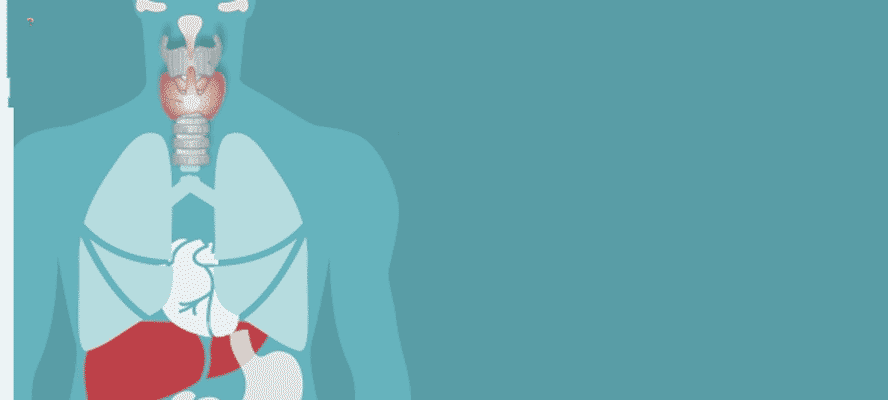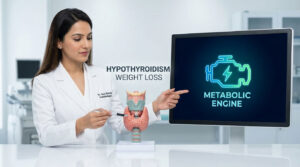How many people in India suffer from thyroid?
Thyroid dysfunction results in an imbalance in the body, which is associated with host of illness. According to various surveys done, it has been estimated that India has over 4.2 crore people diagnosed with thyroid diseases. There are 5 common thyroid diseases in India: Hypothyroidism, Hyperthyroidism, Goiter (lodine deficiency disorders), Thyroid cancer, and Hashimoto’s thyroiditis. Studies from Mumbai manifested that, congenital hypothyroidism is common in India. The statistics shows that, India has 1 out of 2640 infants diagnosed with hypothyroidism, as compared with the worldwide average value of 1 out of 3800 people.
Can thyroid problems cause liver problems?
The Liver plays a salient role in transport, storage, excretion, metabolic of thyroid hormones, and also an important site for hormonal activity. It is the manufacturer of proteins that binds with thyroid hormone, such as Thyroxine-Binding Globulin (TBG), pre-albumin and albumin. It is also the major site of peripheral metabolism of thyroid hormone and involved in Biliary excretion, Oxidative deamination and the Extrathyroidal deiodination of Thyroxine (14) to Triiodothyronine (T3). On contrary, the level of thyroid hormone is also important for normal hepatic function and bilirubin (formed by breakdown of RBCs, where liver helps to excrete the same) metabolism.
Is there a connection between thyroid and liver?
Hypothyroidism can disturb many organ systems including cardiovascular, gastrointestinal, nervous and hepatic system. Thyroid hormones (T3, T4) are essential for normal organ growth, development and function. The function of these hormones is to regulate the basal metabolic rate of cells, including hepatocytes (Liver cells), and thereby modulate liver function. The liver in turn metabolizes the thyroid hormones, and regulates their endocrine effects. Therefore, thyroid dysfunction may trouble liver function, liver disorders modulates thyroid hormone metabolism, and a variety of systemic diseases affect both organs. In this way, their mutual relationship is crucial for maintaining a homeostasis in the body. Overall, it can be said that liver and thyroid gland assist each other for their normal functioning.
What is the main cause of thyroid problems?
Autoimmune Disease:One of the autoimmune diseases is “Hashimoto’s thyroiditis,” a disorder in
which, the immune system turns against the body’s own tissues. In people with this disease, the
immune system attacks their own thyroid, which further results in its underactivity (hypothyroidism).
Stress:Thyroid works in tandem with adrenal glands, located above the kidneys.
These glands can handle small amount of stress well. When stress is encountered, they release
cortisol (stress hormone), which slows down the body’s metabolism and fall in T3 and T4 hormone
levels.
Infection: In the case of a viral infection, the thyroid gland may release thyroid hormone
at once into the blood. In turn, this causes hyperthyroidism for a short period of time. After all the thyroid hormone is released, the thyroid becomes under active.
Fortunately, about most of the patients who suffer from viral thyroiditis regain proper thyroid
function. However, some are left with permanent hypothyroidism.
Radiation: Radiation exposure of thyroid can lead to development of thyroid cancer which is more common in childhood.
Fluoride which is Antagonist to lodine: Fluoride tends to increase the concentration of TSH (TSH) and decreases T3 and T4, which is a feature of hypothyroidism.
Age: The prevalence of thyroid disease increases with age. During aging, the endocrine organs, including thyroid gland, undergo functional changes leading to deterioration of their activity.
Pregnancy: Hashimoto’s disease can cause Hypothyroidism in pregnancy and occurs in 2 to 3 out of every 100 pregnancies.
How to screen for Thyroid Disorder?
TSH test: A TSH test measures the levels of thyroid hormone in the body. The test helps determine whether or not the thyroid is functioning correctly.
T4 test: A T4 test measures the blood level of the hormone T4,which helps in controlling metabolism and growth.
T3 test: A free or total Triiodothyronine (free T3 or total T3) test is used to evaluate the thyroid function. Primarily, it is performed to help diagnose hyperthyroidism and may be ordered to help monitor treatment of a person with a known thyroid disorder.
Thyroid Antibody test: Thyroid antibodies are made, when the immune system mistakenly attacks its thyroid gland. Measuring levels of such antibodies can help diagnose the autoimmune disorders like Grave’s disease and Hashimoto’s disease which are the most common cause for hyperthyroidism and hypothyroidism respectively.
How to screen for Liver Disorder?
Following are the blood test can be used to diagnose liver disease:
The Alanine Aminotransferase (ALT) test: It detects liver damage. It can find out if a disease, drug, or injury has damaged the liver.
Alkaline Phosphatase (ALP) test: albumin is an enzyme, which helps in breaking and joining big molecules into small ones. The amount of ALP is high, when the liver is not functioning properly. This test is often used to look for blocked bile ducts.
Albumin Test: Albumin is a protein which helps to keep the fluids in the bloodstream so that it does not leak into other tissues. This test measures the amount of albumin in the the blood.Bilirubin Test: This test is usually done to investigate jaundice, determine the blockage in liver’s bile duct, detect hepatitis, detect increased destruction of RBCS, etc.
Imaging Test: PET-CT Scan, MRI, Ultrasound, etc can diagnose liver damage
Tissue Analysis: Obtaining a tissue sample (biopsy) from your liver may assist diagnosing liver disorders and signs for liver damage.
By now it is known that liver and thyroid are mutually related. Hence, defect in any one of them can cause severe impact on the other. Therefore, it is important to take preventive measures in order to avoid disorders.
How do I keep my thyroid and liver healthy?
Stop Smoking and consuming alcohol
Do thyroid neck check
Ease up on soy
Keep potassium iodide in limits
Avoid exposure to certain chemicals and toxins
Avoid exposure to people’s blood and body fluids
Get vaccinated ( Hepatitis A and Hepatitis B )
Maintain a healthy
weight Consume proper diet








